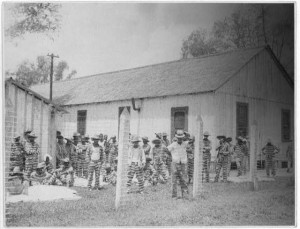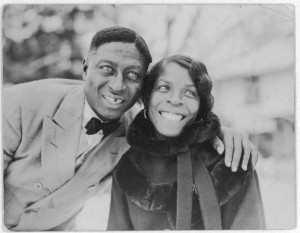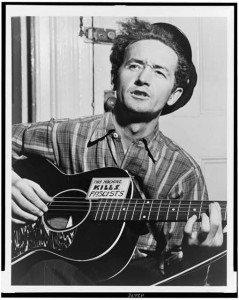For black Americans in the 1930s and 40s, Jim Crow laws made it impossible to forget the color of their skin, even for celebrated musicians performing in upscale venues. Lead Belly, discovered in a penitentiary, was no stranger to these racial prejudices. In a trip to Washington DC in 1937 requested by Alan Lomax, Lead Belly wrote the song “Bourgeois Blues” in response to the unfair treatment he received.
Me and my wife went all over town
And everywhere we went people turned us down
Lord, in a bourgeois town
It’s a bourgeois town
I got the bourgeois blues
Gonna spread the news all around …
I tell all the colored folks to listen to me
Don’t try to find you no home in Washington, DC
‘Cause it’s a bourgeois town
Uhm, the bourgeois town
I got the bourgeois blues
Gonna spread the news all around
Although his life contained many of the hardships described in blues and folk songs, Lead Belly was never quite portrayed as a poor folksperson. Instead, to gain the respect due his talent, he adopted a more professional persona, working extremely hard and finding passion in every aspect of life. In an interview with PBS, Alan Lomax said that “he simply felt that he triumphed over everything” (PBS). In this, he left his early life in the penitentiary far behind.
Woody Guthrie, on the other hand, tried to embody the folky image, but never achieved it fully. He became a spokesperson for the hardships of ordinary Americans but due to his popularity was never a common man himself. And, as a white American, his persona never needed the sort of professionalism that Huddie Ledbetter needed to adopt.
Alan Lomax, a champion of folk music and a believer in its romanticism, spent years recording both Ledbetter and Guthrie and championing their cause as remnants of true American voices. Many Americans who listened to folk music idealized the singers as tortured souls moaning out their troubles. But while Lead Belly and Guthrie experienced the sorrows of racial prejudice, the Great Depression, and dustbowl-era America, neither one completely represented the hardworking common man so heavily lauded in the work of the Lomaxes. Their fame and status as alternative folk heroes lifted them way beyond the label of common man. Instead the common man remains in his dusty home, toiling his hours away and singing folk songs to bring up his spirits.
Sources:
Lomax, Alan. [Prison compound no. 1, Angola, Louisiana. Leadbelly (Huddie Ledbetter) in the foreground]. Photograph. Louisiana, 1934. From Library of Congress: The Lomax Collection. http://www.loc.gov/pictures/collection/lomax/item/2007660073/
Lomax, Alan. Huddie Ledbetter (Leadbelly) and Martha Promise Ledbetter, Wilton, Conn. Photograph. Connecticut, 1935. From Library of Congress: The Lomax Collection. http://www.loc.gov/pictures/collection/lomax/item/2007660385/
Aumuller, Al. [Woody Guthrie, half-length portrait, facing slightly left, holding guitar]. 1943. From Library of Congress: Prints and Photographs Division. http://www.loc.gov/pictures/item/95503348



